Cite this document
(Theory of Psychological Contract - Critical Analysis and Usefulness in Research Paper, n.d.)
Theory of Psychological Contract - Critical Analysis and Usefulness in Research Paper. Retrieved from https://studentshare.org/psychology/1792044-theory-of-psychological-contract-critical-analysis-and-usefulness-in-an-organizational-context
Theory of Psychological Contract - Critical Analysis and Usefulness in Research Paper. Retrieved from https://studentshare.org/psychology/1792044-theory-of-psychological-contract-critical-analysis-and-usefulness-in-an-organizational-context
(Theory of Psychological Contract - Critical Analysis and Usefulness in Research Paper)
Theory of Psychological Contract - Critical Analysis and Usefulness in Research Paper. https://studentshare.org/psychology/1792044-theory-of-psychological-contract-critical-analysis-and-usefulness-in-an-organizational-context.
Theory of Psychological Contract - Critical Analysis and Usefulness in Research Paper. https://studentshare.org/psychology/1792044-theory-of-psychological-contract-critical-analysis-and-usefulness-in-an-organizational-context.
“Theory of Psychological Contract - Critical Analysis and Usefulness in Research Paper”, n.d. https://studentshare.org/psychology/1792044-theory-of-psychological-contract-critical-analysis-and-usefulness-in-an-organizational-context.


